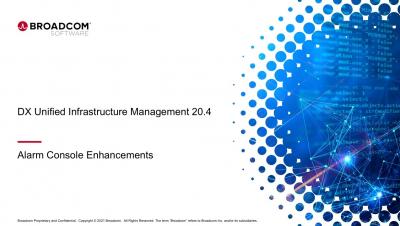Operations | Monitoring | ITSM | DevOps | Cloud
Broadcom
Broadcom Software Announces Designated Weekend Upgrade Program for DX Unified Infrastructure Management 20.4
Broadcom Software is dedicated to ensuring you are on the latest software releases with the most critical fixes, security enhancements, and integrations. That’s why Broadcom Support has developed a DX Unified Infrastructure Management (DX UIM) Designated Weekend Upgrade Program to assist you with a successful upgrade to DX UIM 20.4.
Broadcom and AppNeta Deliver Industry-Leading Network Monitoring and End-User Experience Monitoring
What's Next for AIOps? 4 Trends for the Future of AIOps
As an idea conceived by Gartner four years ago, AIOps is already a mature practice. But it is also one that continues to evolve as businesses turn to AIOps to support new use cases, and as AIOps vendors build better and more efficient AIOps tools. That fact begs the questions: what’s next for AIOps? What are the relevant trends that will shape the future of AIOps over the next several years, and how will AIOps use cases evolve going forward?
Continuous Service Virtualization, Part 2: Steps for Optimizing DevOps
In my prior blog, Continuous Service Virtualization, Part 1: Introduction and Best Practices, we offered an introduction to continuous service virtualization (SV) and discussed some key best practices. In this, the second and final post in the series, we will discuss the continuous SV lifecycle and how it helps to optimize DevOps and the continuous integration/continuous delivery (CI/CD) pipeline.
Continuous Service Virtualization, Part 1: Introduction and Best Practices
Service virtualization (SV) has evolved as a popular technique and technology over the last decade. Traditionally, SV has primarily been used by testers to simulate other application components that the application under test interacts with. Typically, virtual services have been created and maintained by center of excellence (COE) teams.
Leveraging AIOps to Enable Greater Customer Experiences
As time progresses and competition grows, being “good enough” means that you may be falling behind. Engineers will discover new ways to solve problems, which will enable rapid increases in availability and scalability. With these increases comes more complexity and the generation of more data. Rather than just monitoring the new data and letting the old data sit there collecting dust, you should consider using it to gain maximum insights into your environment.
DX Unified Infrastructure Management 20.4: Alarm Console Enhancements
The Top 5 Use Cases for AIOps Today
By now, you’ve likely heard of AIOps, a technique that promises to inject new levels of efficiency into IT operations with the help of AI and machine learning. But what, exactly, does AIOps mean in practice? Which specific use cases can IT organizations enable or improve with the help of AIOps? Those may be more difficult questions to answer if you have yet to see AIOps at work in your organization.
Automic Automation Kubernetes Edition v21
Kubernetes has become a fixture in production for most IT Operations teams. The VMware “State of Kubernetes 2021 Report” shows a distinct shift towards a reliance on Kubernetes, with almost two thirds of respondents now saying they use it in production. Companies with over 500 developers are driving this adoption, with 78% reporting that they run mostly- or all-containerized workloads in production.





